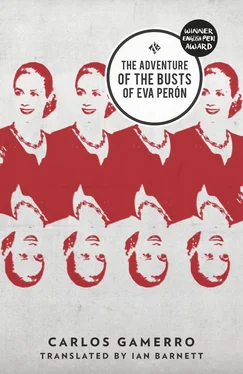Carlos Gamerro - The Adventure of the Busts of Eva Perón
Здесь есть возможность читать онлайн «Carlos Gamerro - The Adventure of the Busts of Eva Perón» весь текст электронной книги совершенно бесплатно (целиком полную версию без сокращений). В некоторых случаях можно слушать аудио, скачать через торрент в формате fb2 и присутствует краткое содержание. Год выпуска: 2015, Издательство: And Other Stories, Жанр: Современная проза, на английском языке. Описание произведения, (предисловие) а так же отзывы посетителей доступны на портале библиотеки ЛибКат.
- Название:The Adventure of the Busts of Eva Perón
- Автор:
- Издательство:And Other Stories
- Жанр:
- Год:2015
- ISBN:нет данных
- Рейтинг книги:3 / 5. Голосов: 1
-
Избранное:Добавить в избранное
- Отзывы:
-
Ваша оценка:
- 60
- 1
- 2
- 3
- 4
- 5
The Adventure of the Busts of Eva Perón: краткое содержание, описание и аннотация
Предлагаем к чтению аннотацию, описание, краткое содержание или предисловие (зависит от того, что написал сам автор книги «The Adventure of the Busts of Eva Perón»). Если вы не нашли необходимую информацию о книге — напишите в комментариях, мы постараемся отыскать её.
Carlos Gamerro's novel is a caustic and original take on Argentina's history.
The Adventure of the Busts of Eva Perón — читать онлайн бесплатно полную книгу (весь текст) целиком
Ниже представлен текст книги, разбитый по страницам. Система сохранения места последней прочитанной страницы, позволяет с удобством читать онлайн бесплатно книгу «The Adventure of the Busts of Eva Perón», без необходимости каждый раз заново искать на чём Вы остановились. Поставьте закладку, и сможете в любой момент перейти на страницу, на которой закончили чтение.
Интервал:
Закладка:
Some Episodes Analysed
The Windmills
In this, perhaps the most famous of all his adventures, Don Quixote charges full tilt at some windmills he takes for fearsome giants, with predictable results: the great sails begin to turn in the wind snapping his lance into several pieces and bringing down horse and rider, who instead of recognising his error accuses some ‘evil enchanters’, who he claims are pursuing him, of having ‘transformed these giants into mills, to deprive me of the glory of the victory’. Although the proverbial phrase ‘tilting at windmills’ has come to be associated with an attitude of heroic or, more properly, ‘quixotic’ idealism, the executive-errant would do well to avoid imitating our knight to the letter. The giants of the market do not surrender at the first charge, their weapons are many and far-reaching, and a small or medium enterprise willing to give battle must tread carefully if it does not want to bite the dust and wind up bankrupt. Windmills perform a useful function, like any big company; seeing them as enemies to be destroyed is another example of the aforementioned quixotic lack of proportion. The executive-errant must rather design better, cheaper, more efficient windmills, and offer them on the market, and the giants will soon become obsolete and collapse under their own weight without anyone having to be ground down to defeat them.
The Helmet of Mambrino
A barber comes down the road, wearing his shiny golden barber’s bowl on his head to protect his hat from the rain. This bowl Don Quixote takes for the golden helmet of the legendary Moor, Mambrino, and after accosting him and tearing it away from him, he dons it himself, to ridiculous effect. The well-known saying ‘all that glisters is not gold’ would do very well to summarise the moral of this new adventure for the executive-errant: how many times on our journey does the oft-sought ‘golden opportunity’ seem to come our way, without us seeking it? That perfect deal whose brilliance blinds us at a distance, but once it is in our hands — and all our capital invested in it — turns out to be yellow brass that we have to ‘wear on our heads’ and we become the laughing stock of the business world.
The Freeing of the Galley Slaves
This episode is especially recommended for any general or personnel managers who might be tempted in these turbulent times to yield before the incessant demands of their employees. In this adventure our hero runs into a chain of galley slaves condemned by the king’s justice, whom without further ado he decides to free, and sets about their guards. And in token of their gratitude he is rewarded with a hail of stones that knocks him to the ground. In this adventure our gentle knight, in the name of an ideal of justice as abstract as it is dogmatic, interferes with, of all things, state justice, setting free a band of dangerous criminals, whose guilt they have confessed to him themselves, thus becoming the first — but probably not the last — victim of their criminal actions. This is precisely the way trade unions or other workers’ organisations proceed today: the workers, often ‘chained’ to them against their will, are led into action by resentful or opportunistic leaders, and shower us with stones where thanks are due. He who yields to the incessant and outrageous demands of strikers and expects those who benefit from his generosity to meet their obligations is not only guilty of quixotic naivety, but may have done his company serious, perhaps irreparable, harm.
An idyllic scene awaited him when he got back to his bedroom: his wife asleep with a child on either side; little Cynthia in the middle of the bed, her tiny, half-open mouth brushing the exposed nipple that peeped out from under the lip of Mabel’s unfastened bra; Tommy at the edge with his mother’s arm around him to stop him falling. Looking at them, he was overcome by a wave of tenderness that reached the depths of his being, where it stirred up a sediment of guilt that muddied the purity of his initial feeling. What kind of a man, he asked himself, extricating little Tommy from his mother’s embrace and carrying him to his room, was incapable of spending some time with his children like any normal father? What kind of a man needed to lock himself in the bathroom to hide from… what? From a two-and-a-half-year-old boy, from a barely two-month-old baby? Was he, at twenty-nine, becoming one of those workaholics he knew so well, incapable of thinking about anything other than their jobs, who before long end up sleeping with the secretary and filing for divorce? (‘In your case not even that,’ his sly right brain whispered to him, ‘she’s sleeping with Cáceres Grey.’) As of today he would do his best to be a better father, he promised himself as he carried the little girl to the bedroom that had until recently been his study, feeling her sweaty brow with the back of his hand to make sure she didn’t have a temperature (he’d call the doctor, he’d save his little girl; reduced to tears, Mabel would say to him, ‘If it hadn’t been for you, I don’t know what would have happened’), checking her nappy to see if it would last till morning — he could always change it, but with the shortage it was wiser to make it last as long as possible. Perhaps, he thought as he slid beneath the sheets and, trying not to make contact with his wife’s body, rigidly lined up his own with the edge of the bed, the problem was that he had got married and had children too young: at an age when others could devote themselves fully to their studies and careers, he had had to divide his energies between work and home. Not that he’d had any choice: he and Mabel had met in the classrooms of the Faculty of Economic Sciences, where he gave classes as an assistant and she was finishing her last subjects, albeit embattled by endless assemblies and occupations and revolutionary trials of lecturers and tributes to Eva Perón and Che Guevara. Fleeing from the upheaval, they had met in the ground-floor bar and shared a complicit cup of coffee. At first, he had thought she looked quite nice, almost pretty if she’d known what to do with make-up, and through the layers of winter clothes her body had looked warm and desirable; but when at the start of the summer he finally managed to divest it of its last wrappings, her naked skin felt unpleasant, like one of those woollen mattresses that are soft on the eye but lumpy to the touch. ‘She needs a good carding, not make-up,’ his mind whispered to him as he caressed her mechanically and, thinking thoughts such as these, for once he didn’t come too soon and, as he collapsed in tears into her arms, he must have made the easy mistake of taking relief for love. They went on seeing each other for two months, at the end of which Marroné was grateful for the respite provided by a trip Mabel and her parents made to Europe, which would give him a month to think about how best to end the relationship without causing her too much pain. But before the month was up, they were back and, by the time he’d recognised his future in-laws’ Mercedes-Benz outside the front door of his parents’ house, and the four progenitors had locked themselves in the living room for talks, and Mabel, her skin all red as if it had been pickled in brine, and wringing a little embroidered hanky between her bitten nails, had broken the joyous news to him, the future course of his life was all mapped out. The wedding took place two weeks later and they did without a honeymoon so that they could do up the house for the arrival of their firstborn, who stopped growing almost immediately and slipped away from them in a miscarriage, and had it not been for the need to put any small-mindedness aside and accompany Mabel through her subsequent depression, Marroné might have felt that to the indignities of blackmail had been added those of a confidence trick. Although over the years he had learnt to like her and appreciate her good qualities, there were times like this, while his sleepless eyes flicked across the shadows on the ceiling in time to the monotonous ticking of the clock, that he asked himself in bafflement if there wasn’t a certain irony to the fact that Mabel had been the only woman he’d been able to have satisfactory or at least full sexual relations with precisely because he didn’t find her attractive enough. Something similar, he told himself, often happened in the world of business: an efficient executive might chafe in the ignoble restraint of a job he considers below his abilities, but when he finally obtains the position he has longed for, next thing he knows his career, instead of being catapulted forwards, has ground to a standstill; he tried to shape this into a general rule that would in the fullness of time bear his name — ‘Marroné’s Law of Inverse Something or Other’ — but sleep was already closing his eyes, and besides, he couldn’t see himself using examples from his sex life in a business presentation…
Читать дальшеИнтервал:
Закладка:
Похожие книги на «The Adventure of the Busts of Eva Perón»
Представляем Вашему вниманию похожие книги на «The Adventure of the Busts of Eva Perón» списком для выбора. Мы отобрали схожую по названию и смыслу литературу в надежде предоставить читателям больше вариантов отыскать новые, интересные, ещё непрочитанные произведения.
Обсуждение, отзывы о книге «The Adventure of the Busts of Eva Perón» и просто собственные мнения читателей. Оставьте ваши комментарии, напишите, что Вы думаете о произведении, его смысле или главных героях. Укажите что конкретно понравилось, а что нет, и почему Вы так считаете.











